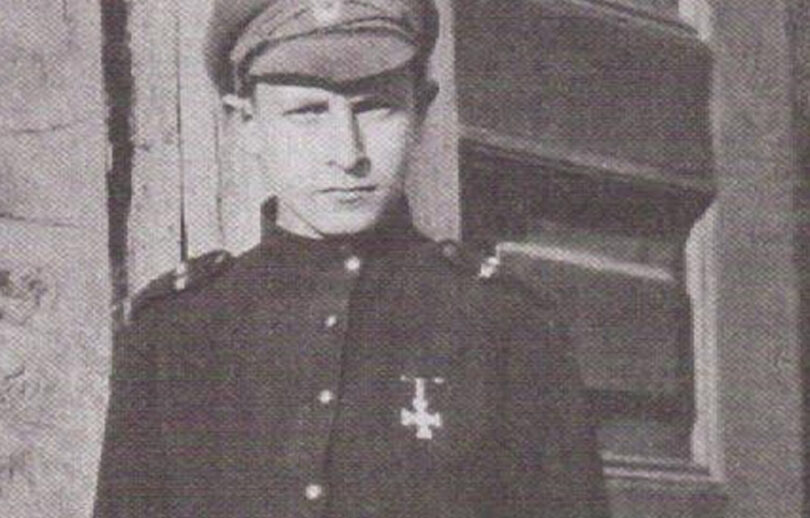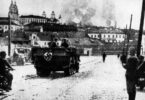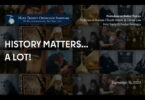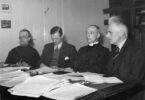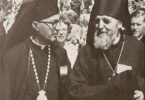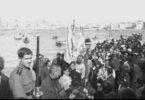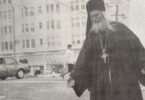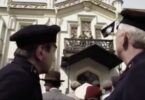On June 20 (July 2), 1919, in Tsaritsyn, which had just been overtaken by White regiments, General A. P. Denikin, commander-in-chief of the Armed Forces of the South of Russia (AFSR), made public his main strategic document,“The Moscow Directive,” presenting the South Russian White Guard armies with task of taking over the Red capital. As aresult of persistent battles, the Whites took Orel, at which point Moscow remained about 300 kilometers away. However, Denikin did not have the reserves to bring about success, while the Soviet command, in turn, hastily sent reinforcements toits southern front and wrought out a victory. After some bloody battles the Whites retreated to the Crimea. Denikin handed over the command to General P. N. Wrangel, who renamed the AFSR into the Russian Army and conducted a series of successful campaigns against the Bolsheviks.
The Civil War in Russia came to an end in November 1920 with the evacuation of General Wrangel’s Russian Army from Crimea. From then on there have been continuous discussions regarding the reasons for the White Movement’sdefeat, at first on the pages of the émigré press and, since the late 1980’s, in our country. It is clear that the totality ofreasons that prevented the counter-revolutionary forces from toppling Bolshevism is quite complex and cannot be reduced to unambiguous and simplified evaluations and deductions, as we currently find in the mass media. In theauthor’s view the research on the history of the Civil War does not give sufficient attention to its religious content. The Bolsheviks who came to power in October of 1917 immediately adopted a harsh anti-Christian position, and in most casestheir actions were of a character that offended the feelings of believers. An exhaustive response to these issues would becomplicated and exceeds the framework of a separate article. A partial understanding of the problem will be helped bystudying the legacy of the memoirs left behind by the White military émigrés, for a great many reminiscences by the WhiteGuard were published both in the emigration, and, starting in the late 1980’s, in Russia. Not only the military leaders of the counter-revolution but also the front-line officerswere unable to formulate the basic principles of the White idea or to express clearly how they viewed it. A conversation between a White army officer and engineers, related in a book by a member of General Markov’s artillery, is noteworthy inthis respect.
Thus, essentially neither the leaders nor the rank-and-file participants of the White Movement ever managed to formulatethe aim of the struggle. But was there at least any kind of moral or spiritual ideal for which grey-haired colonels, who hadgone through a number of wars, and boy cadets went side by side to die? To answer this question, we should turn to thememoirs of a person who was not a direct participant in the White Army but had a direct relationship with it. That was thelast head of the AFSR chaplaincy, Metropolitan (a bishop in 1920) Benjamin (Fedchenkov). Vladyka Benjamin left behind most interesting reminiscences of his life, which contain plenty of thoughts regarding the spiritual causes of thedefeat of the White action. In 1920 he met the writer I. A. Rodionov in Crimea, who is little known today (and in the earlypart of the last century, by the way). This person did not believe in the struggle’s success and explained his skepticismregarding the prospects of the White Movement in the following manner: “… in order to defeat the Bolsheviks one of two factors is needed: either we must crush them by numbers or use our saintliness to defeat them. Both would even be better. Although you are pious here, you are notsaintly. And there is no point in mentioning numbers.” Professor V. Kh. Davats, who participated in the Civil War and considered the struggle with the Reds in its religious aspect, discussed the White idea with the following example:“Lieutenant R. said today that the ideal of truth and goodness, for which we are struggling, stands higher than the ideal of asingle Russia.”
Granted, the Whites were not saintly, and it was impossible to demand, on the bloody fields of a fratricidal war, lofty moralqualities, and the fulfillment of Christian commandments from most of the White Army officers, many of whom had livedthrough the horrors the First World War and the nightmare of the terror that was unleashed against them in the spring of 1917 by soldiers driven insane, when the swiftly disintegrating and spiritually degrading and the once formidableRussian Army had turned into an armed mob of deserters and plunderers. The only ones who were still fulfilling their wartime duty were the officers, who were living under the constant threat of being struck down not only by enemy bulletsbut by being torn apart by their own soldiers. It suffices to say that absolutely all of the military leaders of the White Movement in the south of Russia literally avoided death in 1917 by sheer miracle. It should also be noted that the majorityof the officers who rose up to fight Bolshevism did not belong to the nobility, whose representatives had previously formed the corps of the Russian Imperial Army.
As we read the memoirs of White Army front line officers, we become convinced of their immense spiritual strength and akind of disdain for death. But the question is, was this strength based upon a living religious (or to be more concrete,Orthodox) feeling? Let us examine individual episodes in the memoirs of certain White Army officers that relate to theirreflections and recollections about spiritual experiences in war.
Lieutenant-Colonel Pavlov, in describing the battles that took place in August 1919 south of Kursk, recalled that the Whites had to liberate an ancient women’s monastery, which had become a reinforcement for the Reds, whose intense firing from the bell tower kept the Whites from approaching the monastery. “Should we fire upon the belltower? It took a few shrapnel, and one of the bells, hit by a fragment, responded like the moan of someone wounded. It was a moan which elicited a painful response in the Markovites’ hearts. At night, the monastery’s upper reaches were taken. A group of battalion officers with Captain Slonovsky came to the monastery to venerate its relics. They were met by the monastery’s superior and the abbess. The superior blessed the defenders of the Orthodox faith and handed out black monastic prayer beads, symbols of serving the Church and people. The officers were deeply touched by this blessing.As they placed these prayer beads on their arms, they felt this to be a gift not only to them personally, but to their entireregiment. It was as if fate itself was directing them to the way of Christian service to faith, the fatherland, the Church, andpeople. And then they reminisced… When the First Officers’ Battalion was being formed the question was being raised in its ranks regarding thecreation of companies ‘of the cross,’ which would have crosses on their shoulder straps, symbolic of a campaign for faith and the fatherland… They recalled the blessing of the women’s Monastery of the Protection outside Ekaterinodar. Theyspoke of the blessing by St. Sergius of Radonezh, the heavenly protector of the regiment and its chief, General Markov. It was unusual to see Markovites with monastic prayer beads on their arms. Those who wore them did so withdignity… But this did not catch on since the regiment’s leaders did not treat it seriously. They did not announce this profoundfact to the whole regiment and allowed it to be forgotten. Perhaps, they did so because they knew that in the heat of furiousbattle the voice of Christian conscience becomes muted, the heart hardens, and the violation of the obligation relating to the wearing of prayer beads becomes inevitable. Theregiment’s chaplain was also silent about the blessing. But the beads were not forgotten by everyone — there were those who mentally fingered them in their lives and actions.” He was not an outwardly outstanding figure like Wrangel, and hedid not manage to attain major military victories in fighting the Bolsheviks, as did Denikin. But it was probably this general,out of all the military leaders of the Russian counter-revolution, who was notable for particularly profound religiosity. Alexeev did not leave reminiscences behind, for he had no time for that. From 1915 he was commander-in-chief of the Northwestern Front Armies. As he was accepting this duty he sent a telegram to the Sovereign, which began with the following: “With prayer to God and faith in His holy will…“ The general himself said at one point, “And I am fortunate that I believe, and I believe deeply, in God, and in God specifically, rather than in some kind of blind and impersonal fate.” This heroic general died on September 25, 1918.
General Alexander Borisovich Shteifon, commander of the Belozersk Regiment of the Volunteer Army, was a deeply believing Christian. He reflected extensively upon the reasons for the Whites’ defeat in his reminiscences. Hewrote almost nothing about the religious element in war, but there is an episode that undoubtedly confirms the general’ssincere faith. “We encountered Pascha at the northern edge of the Kamennougolnyi District. The staff of the Third Division(of the Volunteer Army – I. Kh.) was in Dmitrievsk, a small unimportant town near Yuzov. Dmitirevsk had a cathedral, and itwas joyful to stand at the Pascha service, hearing “Christ is risen,” and to be away for an hour or so from stern everyday life, forgetting the bloody battles. The Bolsheviks didn’t bother us. I think that on this holy feast the Red troopsfelt that they were Russians. And that lampada, which is always put in order in a Russian’s soul, was ignited in their souls.But rarely does he ignite it.”
Sincere religious experiences can be encountered in the memoirs of one of the most famous and outstanding White Army generals, A. V. Turkul, who was in the Drozdovsky Regiment on Pascha of 1918, while liberating Rostov from theReds. “The night was windless, warm, and beautiful, a truly holy night. One half-company remained at the train station,while with the other one I walked along the nighttime streets, reaching the Rostov cathedral.” The already mentioned WhiteArmy officer Professor Davats was an actual believer, as the title of his memoirs, Liturgy of the Faithful, bears witness.
The Liturgy of the Faithful… faithful to whom? Far from all the White officers wished to defend faith. Pavlov’s cited memoirs expressly demonstrate the war’s dialectic, with the same people fighting side by side generally for differentideals. Some were inspired by the idea of the rebirth of Holy Russia and wished to fight for the faith of Jesus Christ, whileothers remained indifferent to the religious content of the conflict between the Whites and the Reds. But what inspired thefighting for those for whom a priest’s blessing did not move them to sacrifice and who did not regard their participation in the Civil War as a Liturgy of the Faithful?
We can look at the reminiscences of V. A. Larionov, another Markovite who actually fought alongside Pavlov and was one ofthe bravest White Army officers. He likewise fought the Reds for the monastery and describes its defense in a few words:“The nuns would often bring us thick monastery cream and other tasty items. They would let us rest in their clean cypress-smelling cells and would shut the shutters to keep away the annoying flies. Defending the monastery gave us special power, since we felt we were fulfilling some sort of duty.” Eternal darkness… What is there to fight for, if, afterperishing in battle, there is only eternal emptiness, nonexistence? Many of the White Army officers had an answer to this question, which stands out in all their memoirs. They fought for Russia, or, more precisely, for their inner ideal of the mother country, since Russia cannot exist outside Orthodoxy, outside faith. And this was the tragedy, bothfor the White Movement as a whole and of most of the White officers, many of whom, disillusioned by the struggle, did not manage to survive their exile and the bitterness of defeat, and ended their lives.
There was no need to be under fire in the episode described by Turkul, especially by an inexperienced boy. In anyregular army in such a situation both officers and the lower ranks of the staff would have been removed into shelter. ButTurkul did not give such an order. Instances when officers and even generals, heading large military formations, cameout into the line of fire without absolute necessity were typical of the White Movement.
These lines emphasize that the whites are serving a “beautiful lady” — death. Apparently, such ideals, which are far from Christian ideals, were not characteristic of all officers, but there is still a basis for mentioning the existence of a death cult among some of them. This contradicts the Orthodox worldview that a person must bear his cross to the end, and onlyGod is free to decide when the journey of our earthly wandering will be completed. We do not have the right to take ourlives ourselves, however its circumstances might take shape, and even more so to create poetry cultivating death. Yes, a Christian warrior should be ready to die, but he should not seek death.
Another cult existed among certain White officers which involved the worship of leaders. This was demonstrated with particular vividness in the cult of the legendary General M. G. Drozdovsky, who died in January of 1919. This man brought adivision he had formed in Romania to the Don and voluntarily submitted to General Denikin. The already mentioned General Turkul wrote “We believed in Drozdovsky no less than we believed in God (my italics). Faith in him was a feeling that was just as self-explanatory, going without saying, as conscience, duty, or brotherhood in battle. If Drozdovsky said so, that’s the way it should be, and it cannot be any different. For us an order from Drozdovsky wasundisputed and undoubted truth. Our commander was the living focus of our faith in the realized truth of our struggle forRussia.” However, if you come out only against something, it is very difficult to attain victory, since you need to be “for”something. The Whites did not have that, if, of course, we disregard the idea of struggle for a single undivided Russia, which was advanced by Denikin. For many reasons this idea inspired neither the governmental formations that aroseon the outskirts of the collapsed empire nor the workers and the peasants. Yet it would seem that it was possible to fightfor faith. Not all officers had to be religious, but why didn’t the leaders of the White Movement announce that the defenseof Christianity was the aim of the struggle? Vladyka Benjamin recalled A. P. Kutepov, one of the more famous of the White generals, told him and General Wrangel how the aims of the war were being
discussed by Denikin’s cohorts: “According to the old tradition, the saying went, ‘For the faith, the tsar, and the fatherland.’They were going to include the first formula, but, according to eyewitness Kutepov, General Denikin, as an ‘honest soldier,’protested, claiming that this would be a lie, false propaganda, that it is not actually present in the movement.” What is sucha position based upon? Bishop Benjamin had a response to this question. Neither the majority of regular soldiers nor ofthe top White officers were church oriented. Vladyka, who was closely associated with General Wrangel, described a typical episode: “The general, as was customary, came up to me, as to a hierarch, for a blessing, loudly snapped the top of his right hand against his left palm, and after my blessing did not even bring my blessing hand to hismouth. Again, I am saying this not in judgment, but that’s how life was. Everything was just a form, an appearance, whileinside there was a feeling of the superiority of secular authority over the Church.” (My italics) At the same time Bishop Benjamin mentions an episode in his reminiscences when the Crimean Synod scheduled Days of Repentance for September 12-14, 1920. He writes of huge numbers ofsimple people who came to confession and communion on those days, but a little later he received a letter from a piousbeliever with the following complaint: “Vladyka, where is our leadership? Why do none of them show up in the churches?Do only workers need to repent, but not they?” Bishop Benjamin showed this letter to Wrangel and got a characteristicresponse: “Vladyka! We are also believers. But we were brought up differently in our families and schools. We did not advertise our religiosity and were even shy about demonstrating it. We can also be understood, and we have so much to do.”
In his memoirs Wrangel recalled a most important episode in his life, having to do with choosing a successor to General Denikin. Then, in April of 1920, only Crimea was in the hands of the Whites. Many of the Don and Kuban Cossacks were demoralized by defeat and only some of the volunteer units maintained the lofty spirit of battle. Wrangel understood that it was he who was most likely to take command of the remains of the few White Army troops, and that the chances forvictory were minimal. He had the right to refuse to take up the difficult cross of leading an army doomed to defeat, but asan honorable officer he deemed it necessary, in his own words, “to drink of the bitter cup to the full.” Wrangel recalled thatthe bishop came up to him, saying “I decided to bless you with this ancient icon when you arrive here for your new exploit.” “I went down on my knee, and Vladyka blessed me. A heavy stone fell from my heart, and light entered mysoul.”
It must be said that Wrangel’s prayer amazed the bishop, who recalled, “These three crosses made a great impression uponme… this prayer, which was his own, spoke of his personal faith, his plea for God’s help, and placing all of himself and allmatters into the hands of Providence.” It should be added that Wrangel’s faith and the bishop’s blessing, as well as the Mother of God’s intercession for the White troops allowed the baron to conduct the successful evacuation of the RussianArmy from Crimea in November of 1920.
And yet… The Whites still had no religious awakening. Bishop Benjamin recalls the miraculous Kursk icon of theMother of God being brought to Crimea. A huge number of people came out to see the icon in Sevastopol. “General Wrangel and Krivoshein came out for this.” It should be noted that Vladyka said that Wrangel and Krivoshein “were not aflame in spirit” and simply “humbly obeyed” Bishop Benjamin as they took the miraculous icon.
However, it wasn’t always that at least visible humility and piety toward Orthodox holy objects were demonstrated by theWhite Army troops. In 1920 the bishop went personally to the front with the miraculous icon. Along the way “crowds of people welcomed it everywhere. This was the old Russia! Then I took it myself to the front in a separate car. GeneralTurkul was the first to greet me with a convoy. There was a parade and a moleben. I have no idea what was in the heartsof the military
leaders. I admit that my belief in the zealousness of their faith was not very strong. I recall that during a procession in Alexandrovsk officers were standing around by the window in the staff headquarters and carelessly smoking as theywatched the procession with total indifference.“ He then continues: “I went outside and came across a boy soldier of about13 or 14 who was having a rude conversation with someone. And I could hear that he was using the most vulgar swearwords while cursing God, the Mother of God, and all the saints!… That kind of language was everywhere in the air.”
There were also rougher assessments, about which Vladyka writes, recalling a conversation with a certain piousofficer who said the following: “How can we, who are little imps, conquer the large devils, the Bolsheviks?” Moreover, Saint Patriarch Tikhon, in his message of October 8 (September 25), forbade “… theclergy from greeting the Whites with bell ringing and molebens.” Memoirs were written which, for the most part, lackedany deep spiritual reflection on the reasons for the White Movement’s defeat. Paradoxical as it may seem, one of those whosaw the events of the Civil War not in the collisions of earthly history but in a mystical framework was a person who endedup, not at all according to his free will and heart’s command, in the ranks of the Red Army. This was one of the best ofRussian generals, Alexei Alexeevich Brusilov, who wrote this shortly before his death: “At that time (in the period of the February 1917 events, when Brusilov supported the tsar’s abdication and accepted the Revolution) I did not yetunderstand that our Russian revolution no longer existed… something totally different came upon us. This was a universalantichristian fight, intending to destroy the entire light of Christ in the name of satanic darkness… Someone said correctly that the Bolsheviks found themselves in the dark antechamber of that large antichristian movement whichguides them, and they don’t know themselves who is giving them their directives. We believers are especially guilty, sincenonbelievers did not understand much, while we Christians had to understand… Merezhkovsky was absolutely right when he declared that our liberal atheistic intelligentsia and the Bolshevik Communists have a point of contiguitywith each other which is equivalent and similar in the sense of their guilt before Russia, since they were destroying theChurch and the people’s faith in the same manner.”
Finally, it is necessary to point out yet another reason that kept the Whites from using the defense of faith as their slogan. Inthis article the members of the White Army were called counterrevolutionaries. However, that was true only with respect tothe Bolshevik regime. Essentially, the Whites were also… revolutionaries, fighting for the ideals of the February Revolution,which were not all permeated by the Christian spirit…

